
Christopher Cooksey, aka Christopher Moonlight is a co-producer, along with his good friend Doug Mayfield of Escape From Planet Omega-12. “We’re currently putting together an amazing cast and crew of talented artists. I can’t quite say who our voice talents are just yet. But, I promise that they’re not only talented but also meaningful in who they are as staples in this genre. Which I think is going to really matter to our target audience,” says Christopher Cooksey.
indieactivity: What is your experience working on the story, the screenplay, the production, premiere and the marketing?
Christopher Cooksey (CC): The story is a result of a years-long process between Doug and I. Which may not be something that sounds ideal if you’re a Hollywood producer looking to get something from script to screen. But, has resulted in an environment where we can now do quick turnarounds on writing episodes. Because, we spent all that time having endless conversations of about what the world of our story is and who our characters are. I actually learned to write from comic books where you have to deliver an issue every month and it has to be good.
That comes from having a deep knowledge of what’s motivating every aspect of the story and working with an artist that also understands it because they’re going to give the visuals a new dynamic. In our case, that means we don’t consider the last draft of the script to be the final one. We use the visual language of the storyboards to continue to evolve things because there’s a lot of nuance and possibility to be found in the action. If you’re directing live action, you find that on the set with your cast and crew but since we’re doing draft after draft of each scene using animation, we have a lot more time to find out what it wants to be.
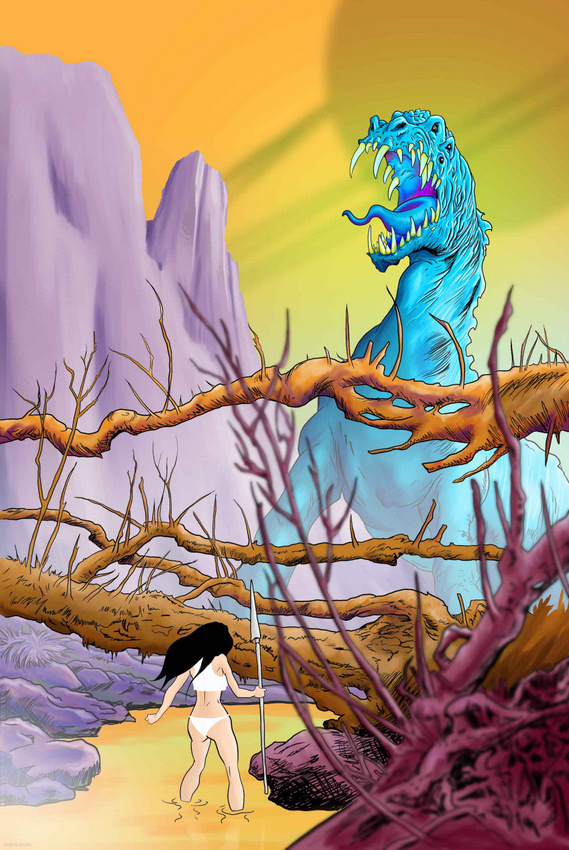
How did you put the crew and cast together? Did you start writing with a known cast?
Christopher Cooksey (CC): It’s funny, but when I’m just creating the characters in my imagination. I’m free to cast anyone I want and then use their voices to help drive how the characters talk. It really helps me give them individual personalities but as I go, I’m always looking for who I’m going to work with. I don’t often audition but rather talk to people and get an intuition as to how they’ll play. Not to brag but I’m almost always right.
Val Mayerik, who is a legend in the comic book industry, and also co-created Howard the Duck, happens to also be an actor. I worked with him on my first movie, The Quantum Terror and we became fast friends. We’ve since worked on two short films together, both of which are still in post-production. I knew that I had to get him to voice a little robot character that we have. He has a charm and sincerity to him that just works for me.
What and how long did it take to complete the script?
Christopher Cooksey (CC): I don’t know if I’d even say that the script is ever complete. Because, if our first season, which will be 4 episodes, works then we’ll just keep evolving it. It’s been a fun challenge because we have to keep doing beginnings, middles, and ends. Just giving enough closure where the audience will feel satisfied. But not too much because we want them to want to know what happens next.
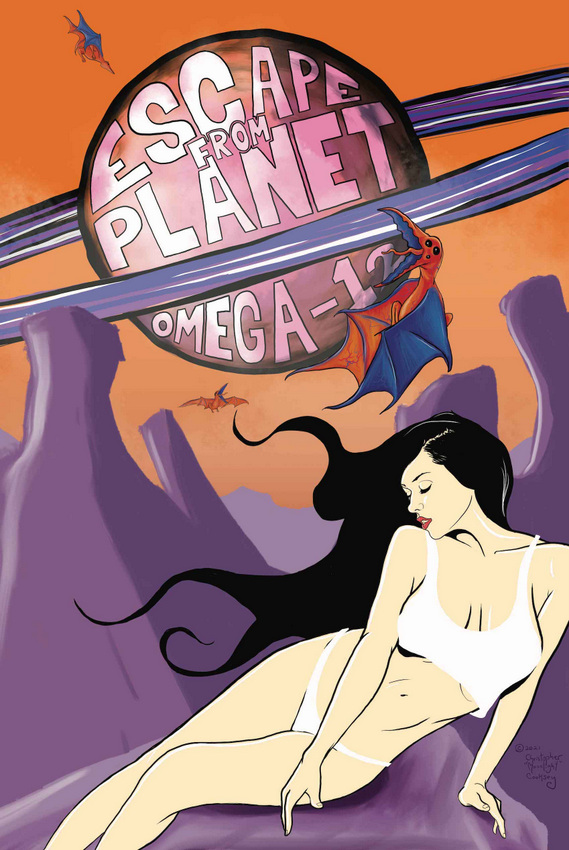
When did you form your production company – and what was the original motivation for its formation?
Christopher Cooksey (CC): We form a new LLC for every movie we make, so each project is its own entity that doesn’t affect the integrity of the other. I’ve had Christopher Moonlight Productions for longer than I can remember but that’s just the umbrella for everything else I do, whether it be my own stuff or working on other people’s movies.
What was the first project out of the gate?
Christopher Cooksey (CC): Ooo, that’s a tough question to answer because when I first got started, I didn’t know what I was doing. I had always wanted to make movies but didn’t know where to begin, so I did underground comic books, showed artwork at galleries, and did little screen tests and a mini-documentary about Hollywood taking over the San Diego Comic-Con on a couple of really low-end consumer cameras, where I went around the showroom floor and interviewed artists I knew.
It was actually at Comic-Con in 2012 that things started to coalesce. All of these events all sort of started to happen at once. I was working two doors down from the Oscar-winning special effects company Amalgamated Dynamics Inc. and starting to form a friendship with them, I had been hired to do some special effects for the author Ray Bradbury, and yet everything was falling apart, financially.
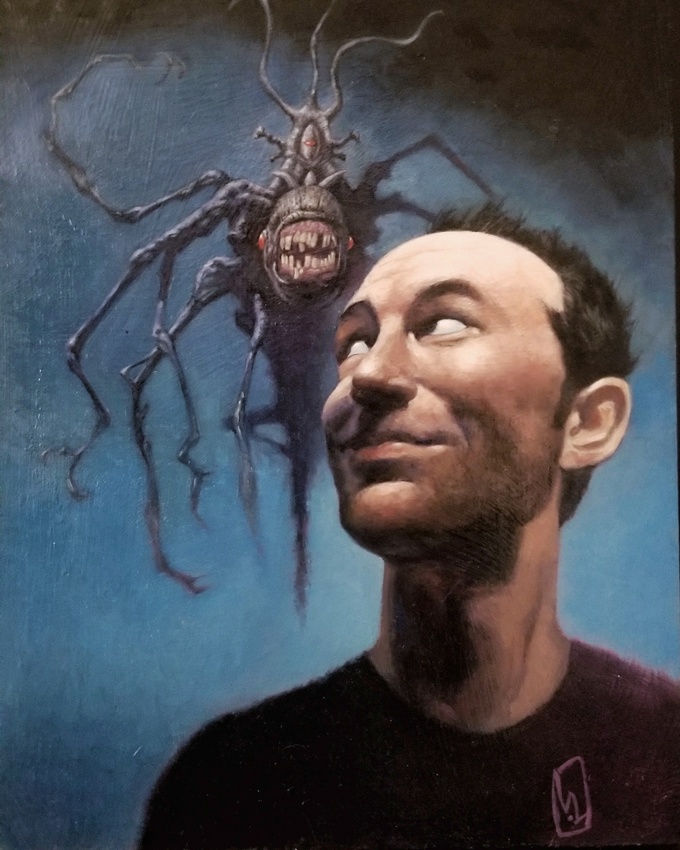
My wife and I had grown up in California, but with our second child on the way we just couldn’t afford to live there anymore. We had decided to move to Austin, TX because there was supposedly a thriving indie-film scene there. But, we wanted to hit SDCC one more time before we went and who should appear at Hall H but Robert Rodriguez himself. He announced that he was bringing the museum dedicated to legendary pulp artist Frank Frazetta to Austin, as well as the production of a live-action version of the animated sword and sorcery epic Fire and Ice and a live-action version of Heavy Metal, as a sci-fi anthology.
Not only that, but he was going to hold another one of his talent contests where the winner would get to direct his own short that would go in the movie. I thought, “This is my ticket in. I know how to do green screen work like he does and all of those elements were what shaped my personal creative aesthetic. They were a huge influence on me. However, reading the terms of the contest, I realized that it was just an IP fishing expedition where you sent in your ideas and his company automatically owned them, whether they used them or not. There was a lot of that going on back then and I thought, “To hell with this, I’m just going to make it, myself.”
So, while we’re packing for Austin, I’m also hanging green screens from the ceiling of our apartment and bringing in actors and filming on DV cameras, thinking I can get away with the grindhouse style. I almost did, too. I took post-production to Texas with us but then one of the talents got cold feet and didn’t want to be in it anymore. They now had representation with a lawyer behind them and started making a stink about things, so I had to abandon the whole thing, even though it was shot.
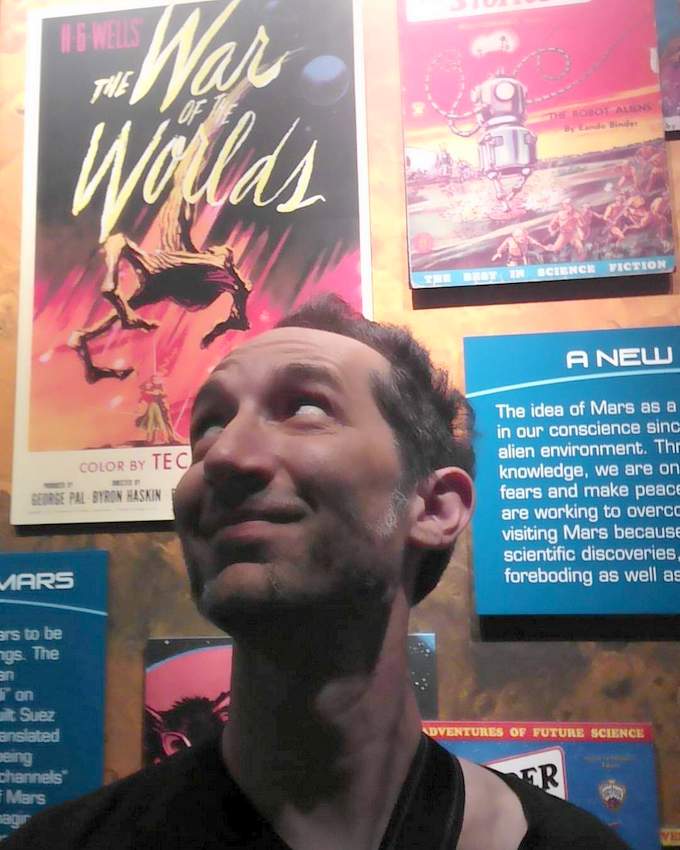
However, by then I was now working with ADI on their first independently produced movie, Harbinger Down, in which they were creating all sorts of amazing practical effects creatures using cheap materials. That whole experience was like film school for broke people, which I still was, so after that, I built sets in my garage and made The Quantum Terror, using what I learned from them. They even sent me some cable-controlled tentacles from their shop to use in my film. It was all done on a shoestring but now that movie is out on Tubi and Amazon, among other VOD platforms and I’m really proud of it.
During the film production, what scene (that made the cut) was the hardest to shoot? And why?
Christopher Cooksey (CC): Well, for Escape From Planet Omega-12 we’re still creating scenes but they’re all challenging because we’re kind of making a live-action movie and an animated movie at the same time. Instead of building sets in the computer or doing painted backdrops like in a traditional cartoon, we’re building miniature sets, just like we did for a lot of The Quantum Terror but in this instance, instead of trying to integrate actors with them as we did before, we’re bringing in characters that are a combination of 2D and 3D CGI and hand-drawn cell animation. We’re using performance capture so we’re working with a dancer for that, so that’s like directing talent on set, and then we’re also using practical effects puppets for a lot of the alien monsters. In essence, every shot is a visual effects piece so every shot will have its challenges.
We had similar challenges on The Quantum Terror, too. The biggest hartal to overcome in that instance was just getting the actors to trust that all this crazy stuff we were having them do was going to work when it was all cut together. Aside from the green screen work, I remember a scene where the characters have to climb down an endless concrete shaft. The set was literally Styrofoam sheets painted to look like concrete because I couldn’t afford to build it out of anything else and have it still be safe for the actors. They couldn’t hold onto anything. It would break, so we had to lay the whole thing on its side and have the actors crawl on it, pretending to hang on, while we shot them with the camera sideways.
It was really cool when the movie was done though and they say it. You could see on their faces that they got it and got a thrill from the effect.
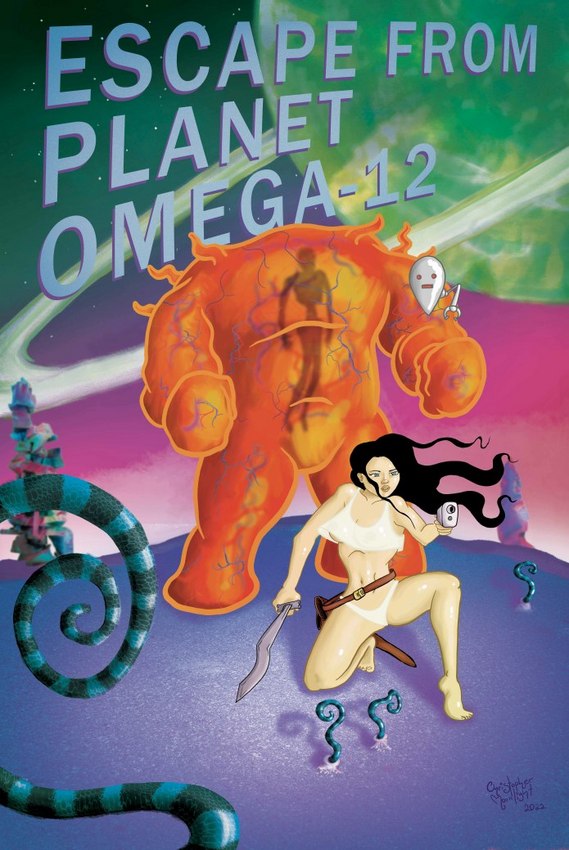
What worked better in this latest production that mightn’t have worked so well in the last one you did?
Christopher Cooksey (CC): With animated characters, you can do things to them or have them do things that you wouldn’t necessarily be able to do with actors. When I originally conceived of The Quantum Terror it was going to be a lot more crazy and erotic but the simple fact of the matter was that I was paying new actors very little to give their all on set and I wasn’t going to ask that of them. It wasn’t just that they weren’t being paid enough to make that commitment but I find that you can really only do that with more seasoned actors who know how they want to express themselves on screen without feeling like they’re being exploited.
These guys were all young and figuring out who they want to be as artists and I wasn’t about to put them in a situation that they might not feel good about on set or in the future. With an animated character, it’s different. They’re not real so you don’t have to worry about what they go through to give you the performance you’re looking for.
You must have donned several hats on this film, the measure of your input required intellect, effort, tenacity, skill (…you know better). What did it take you to put out all these qualities to get the film done?
Christopher Cooksey (CC): I wouldn’t say I know better and in fact if I did I probably wouldn’t keep doing this. Haha. The fact is, if it weren’t for all the technology that’s become available over the last couple of decades I wouldn’t be able to get this done because there isn’t a single aspect of anything I’ve ever produced that I didn’t touch. Writing, directing, audio, animation, effects, editing… However, over the years I have formed friendships with some really talented people who have allowed me to delegate tasks that in the past I would have spent endless hours on. Between those two things, I’m doing things that in the past, it would have taken a major studio millions of dollars and hundreds of people to do. Now, we have AI-driven motion capture, 4K cameras, home studios, and boutique self-distribution to video-on-demand. What a time to be an independent filmmaker!
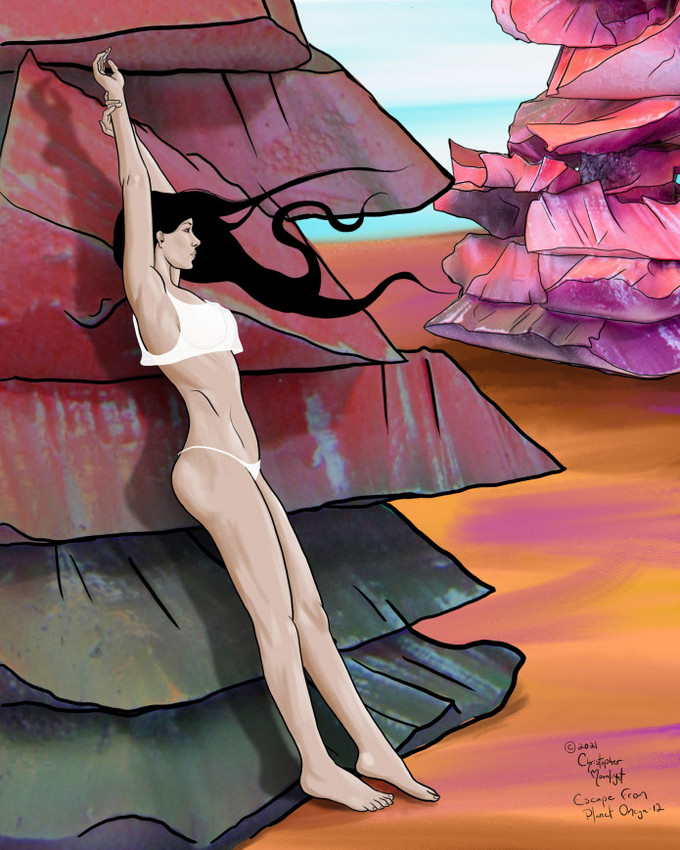
What about independent filmmaking and the business do you still struggle with?
Christopher Cooksey (CC): It’s twofold. I’m a family man and I work a full-time job so work/life balance is important to me. It’s very easy to go into full workaholic mode but that’s just not good for your soul. People say all the time that if you want to make it then you have to work harder than everyone else but I don’t think that’s true. I think creativity comes from living, not working every waking hour. You have to remember that or else you won’t have a story to tell and show business is the business of telling great stories.
The other aspect of it is convincing people that they don’t have to get their entertainment exclusivity from the big studios. I see so many pop-culture fans complaining about how the studios are run by people who hate them and take pleasure in destroying their franchises. I say to them, “Then walk away. You don’t own these properties, they do so they don’t have to listen to you. They just need you to keep giving them your money.” But they do keep coming back. They do keep giving them their money because they keep hoping that somehow the next Star Wars movie or Marvel movie, or whatever will be different. They’re plugged in and just don’t have the willpower to seek life elsewhere.
I suppose I understand that, though, in the sense that low-budget indie films aren’t exactly going out of their way to wow people. A lot of it is a sea of low-effort, poorly produced art-school nonsense, that the audience has to put a lot of effort into wading through to get the good stuff. If you’re working a full-time job and raising a family, you don’t have time for that. You just want to sit down and enjoy something and sticking with what you know is the easy path to that. It’s my hope to make it easy for the audience but that takes work.
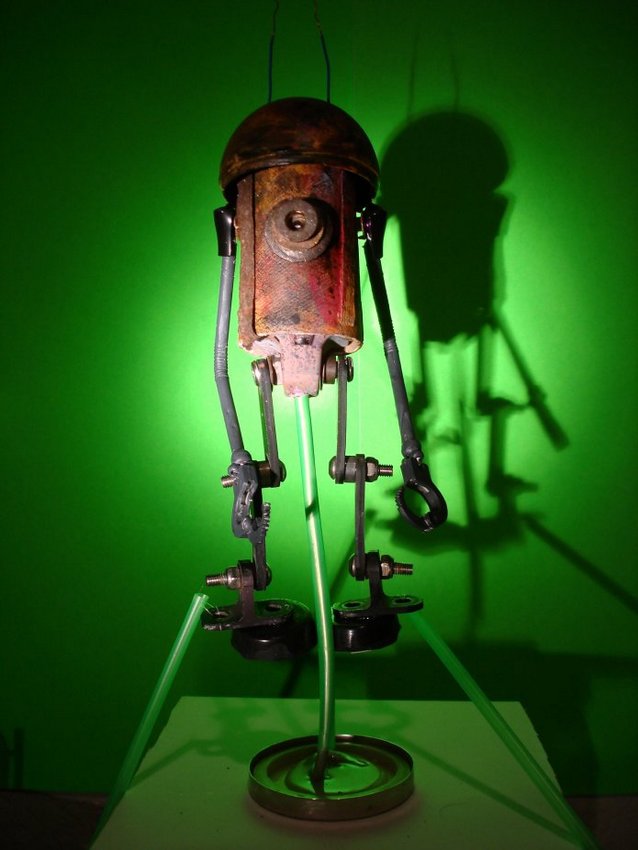
Where do you think your strengths lie as a producer?
Christopher Cooksey (CC): Oh, that’s easy. I don’t make anything I wouldn’t want to see myself. And I’m very hard to get a watch commitment out of. I channel surf VOD menus all the time and often end up choosing not to watch anything at all. I figure most people are becoming like that, these days so I really try to only make things that people can’t help but look at and think to themselves, “This is special.”
Let’s talk about finance. How did you finance the film?
Christopher Cooksey (CC): With The Quantum Terror I did a combination of crowdfunding, scraping from tax returns, selling my car, and getting an investment from Doug. Doug is the investor on Omega-12 but I’m also putting in my own money and we have a Subscribe Star account where people can contribute behind-the-scenes content In real-time as we make it.
How much did you go over budget? How did you manage it?
Christopher Cooksey (CC): We’re still on budget and I think I have to take credit for that. I’m very good at figuring out what I can get for the money and then figuring out what kind of story I can tell with that. Creativity is about being flexible. If you can’t tell your story without spending more than you think you’ll make back then you’re not creative, you’re arrogant. We set a budget and I figured out how much I could pay people to do so much work and anything over that I made up with my own sweat equity. That’s just the way you’ve got to do it. It’s the old saying, you can have it fast, cheap, or good but you can only pick two. We’re going for cheap and good so we can take the time we need to give the craft some real love.
How important is marketing? Do you think a project can make a dent without it nowadays?
Christopher Cooksey (CC): In a sea of people trying to get your attention on social media, you have to stand out but by the time I’m done with the creative stuff I have very little bandwidth for marketing so I think a good PR person is like money in the bank. When we budgeted our film we wanted to make sure that every penny ends up on the screen, except for marketing. We lowered our budget so we could hire David, our PR guy, and will never regret that decision.
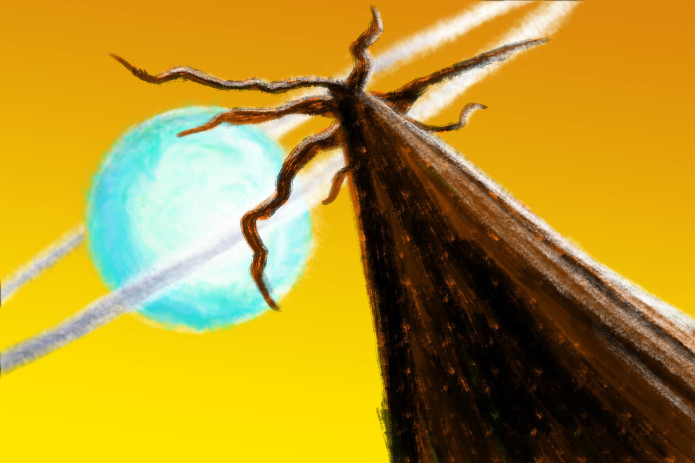
Tell us about marketing activities or efforts on this project – and how it worked or didn’t work?
CC: Well, the typical social media stuff most often lands with a thud, unless you pay for ads. My favorite marketing platform is YouTube. I have my own channel, which is cool but I’ve kind of fallen in love with the live-stream community because that’s where the fans live. They’re passionate beyond anything I’ve ever seen and they want to know that the people creating their entertainment really care. If you’re just trying to shovel a product at them, they’ll sniff it out in a heartbeat and call you out but if you show them that you want to deliver on something good, they’ll champion you all the way.
What do you hope audiences will get from the presentation of your film?
CC: This will seem like a strange answer but, I have to say shared values. A lot of people are not only rejecting but actively turning on Hollywood these days because they see that there’s a kind of nihilistic depravity permeating entertainment. They’re being preached to by people who change the rules of what’s acceptable whenever it suits them. At one moment they’re over-sexualizing everything and the next moment they’re prudish and audiences feel like they can never win or get something with any real meaning to it.
With Escape From Planet Omega-12, I’m offering something that isn’t going to preach to people or tell them what they should think but rather present something to them in a way that they’ve never quite seen before and maybe a story that they’ll find useful in their own way. It won’t be up to me how, though. Think that’s what all the best stories do. They give you an access point where you can relate to it on a personal level and it’ll mean something different to you than the next person. For me, I want to do something that’s exciting, sexy, and fun but most importantly beautiful. We don’t think about beauty as much as we should, these days, at least in my opinion. I want to make something that makes people stop and make people just live in that moment of the story because it’s beautiful.
What else have you got in the works?
CC: Well, I have a completed Christmas horror movie script that I’m really excited about. I’ve always loved Christmas time and it’s fun when people combine nightmares with holidays but I’ve always felt that they always end up a bit silly and repetitive. I think that Doug and I have found a way to bring some real darkness in the context of the spirit of Christmas in a way that no one has ever seen before, even if at first they think they have.
We also have another sci-fi feature script done, which I describe as Twelve Angry Men meets The Thing, and another one that I jokingly call The Matrix meets Shakespeare in the Park with no special effects. They’re all stories that we’re really passionate about because we feel they’re both really high-concept yet nothing we imagine a big studio would ever think to do. I think with the way the tide is changing in the market, that’s going to matter in the next few years, if not already.
Tell us what you think of the interview with Christopher Cooksey. What do you think of it? What ideas did you get? Do you have any suggestions? Or did it help you? Let’s have your comments below and/or on Facebook, Instagram, or Twitter.
Christopher Cooksey Socials
IMDb
LinkedIn
Facebook
Instagram
YouTube
MORE STORIES FOR YOU
Richard Green Documentary, ‘I Know Catherine, The Log Lady’: Premiere in NYC, LA May 9th
Lynchian Doc I Know Catherine, The Log Lady Makes Hollywood Premiere 4/17, Rollout to Follow
In Camera by Naqqash Khlalid Launch on VOD April 29
Naqqash Khlalid’s Directs Nabhan Rizwan. In Camera stars an EE BAFTA Rising Star Award Nominee.
2025 Philip K. Dick Sci-Fi Film Festival Award Winners Announced
Vanessa Ly’s Memories of the Future Awarded Best PKD Feature
Dreaming of You by Jack McCafferty Debuts VOD & DVD for April Release
Freestyle Acquires “Dreaming of You” for April 15th Release
Hello Stranger by Paul Raschid set for London Games Festival & BIFFF
The film Is set for an April 10th Premiere at The Genesis Cinema in London (LGF) and BIFFF
Daydreamers Official Trailer by Timothy Linh Bui: Released by Dark Star Pictures
Daydreamers Vietnamese Vampire Thriller – May 2nd release









